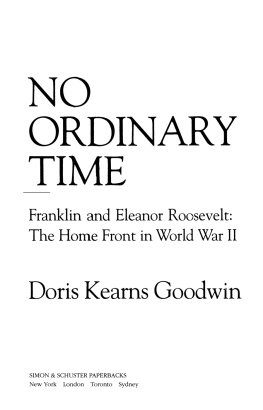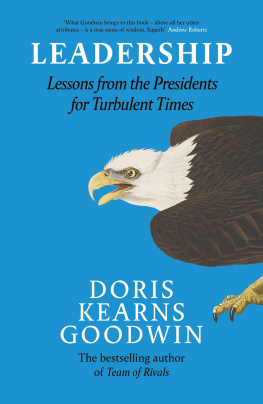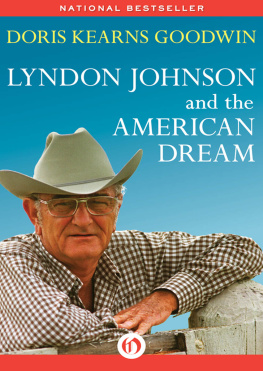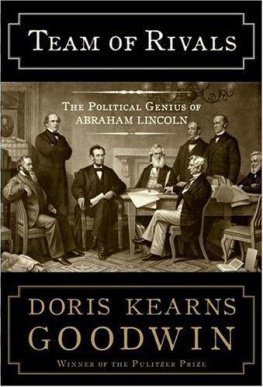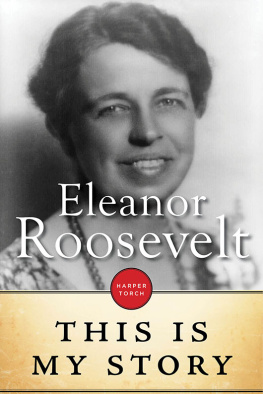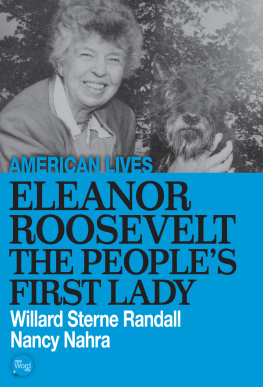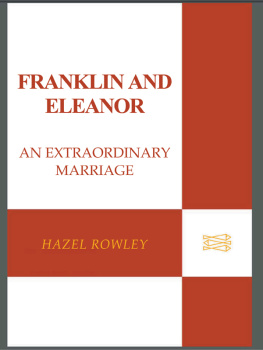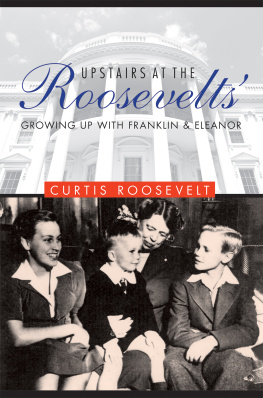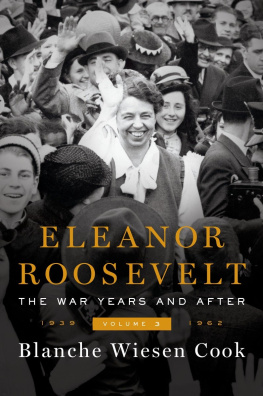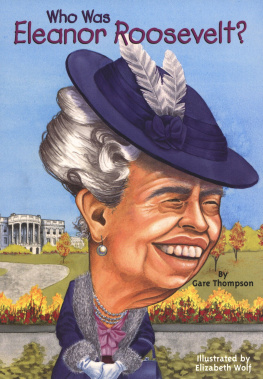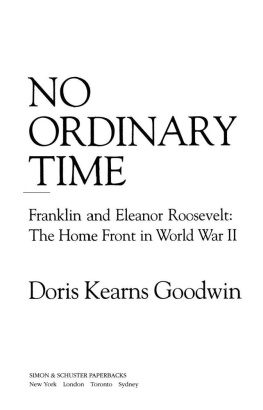Read on for an excerpt from Doris Kearns Goodwins latest book:
The Bully Pulpit:
Theodore Roosevelt, William Howard Taft, and the Golden Age of Journalism
On sale November 5, 2013.
CHAPTER ONE
The Hunter Returns
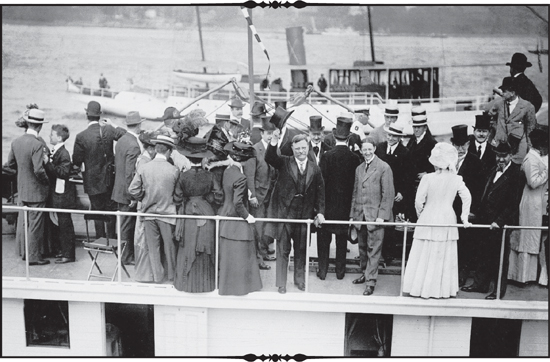
Theodore Roosevelts triumphal return from his African tour, 1910.
R OOSEVELT IS COMING HOME, HOORAY! Exultant headlines in mid-June 1910 trumpeted the daily progress of the Kaiserin , the luxury liner returning the former president, Theodore Roosevelt, to American shores after his years safari in Africa.
Despite popularity unrivaled since Abraham Lincoln, Roosevelt, true to his word, had declined to run for a third term after completing seven and a half years in office. His tenure had stretched from William McKinleys assassination in September 1901 to March 4, 1909, when his own elected term came to an end. Flush from his November 1904 election triumph, he had stunned the political world with his announcement that he would not run for president again, citing the wise custom which limits the President to two terms. Later, he reportedly told a friend that he would willingly cut off his hand at the wrist if he could take his pledge back.
Roosevelt had loved being presidentthe greatest office in the world. He had relished every hour of every day. Indeed, fearing the dull thud he would experience upon returning to private life, he had devised the perfect solution to break his fall. Within three weeks of the inauguration of his successor, William Howard Taft, he had embarked on his great African adventure, plunging into the most impenetrable spot on the globe.
For months Roosevelts friends had been preparing an elaborate reception to celebrate his arrival in New York. When the Colonel, as Roosevelt preferred to be called, first heard of the extravagant plans devised for his welcome, he was troubled, fearing that the public response would not match such lofty expectations. Even at this moment I should certainly put an instant stop to all the proceedings if I felt they were being merely worked up and there was not a real desire... of at least a great many people to greet me, he wrote one of the organizers in March 1910. My political career is ended, he told Lawrence Abbott of The Outlook , who had come to meet him in Khartoum, the capital of Sudan, when he first emerged from the jungle. No man in American public life has ever reached the crest of the wave as I appear to have done without the waves breaking and engulfing him.
Anxiety that his star had dimmed, that the publics devotion had dwindled, proved wildly off the mark. While he had initially planned to return directly from Khartoum, Roosevelt received so many invitations to visit the reigning European sovereigns that he first embarked on a six-week tour of Italy, Austria, Hungary, France, Belgium, Holland, Denmark, Norway, Germany, and England. Kings and queens greeted him as an equal, universities bestowed upon him their highest degrees, and the German Kaiser treated him as an intimate friend. Every city, town, and village received him with a frenzied enthusiasm that stunned the most sophisticated observers. People gathered at railway stations, in school-houses, and in the village streets, one journalist observed. They showered his carriage with flowers, thronged windows of tenement houses, and greeted him with viva, viva, viva Roosevelt! Newspapers in the United States celebrated Roosevelts triumphant procession through the Old World, sensing in his unparalleled reception a tribute to Americas newfound position of power. No foreign ruler or man of eminence could have aroused more universal attention, received a warmer welcome, or achieved greater popularity among every class of society, the New York Times exulted.
I dont suppose there was ever such a reception as that being given Theodore in Europe, Taft wistfully told his military aide, Captain Archie Butt. It illustrates how his personality has swept over the world, such that even small villages which one would hardly think had ever heard of the United States should seem to know all about the man. The stories of Roosevelts royal progress through Europe bolstered the efforts of his friends to ensure, in Tafts words, as great a demonstration of welcome from his countrymen as any American ever received.
In the week preceding his arrival in America, tens of thousands of visitors from all over the country had descended upon New York, lending the citys hotels and streets a holiday appearance. Inbound trains carried a cast of characters as diversely typical of the American people as Mr. Roosevelt himself... conservationists and cowboys, capitalists and socialists, insurgents and regulars, churchmen and sportsmen, native born and aliens. More than two hundred vessels, including five destroyers, six revenue cutters, and dozens of excursion steamboats, tugs, and ferryboats, all decked with colorful flags and pennants, had sailed into the harbor to take part in an extravagant naval display.
An army of construction workers labored to complete the speakers platform and grandstand seating at Battery Park, where Roosevelt would address an overflow crowd of invited guests. Businesses had given their workers a half-holiday so they could join in the festivities. Flags floated everywhere, an Ohio newspaper reported; pictures of Roosevelt were hung in thousands of windows and along the line of march, buildings were draped with bunting.
The night before the big day, a dragnet was set to arrest known pickpockets. Five thousand police and dozens of surgeons and nurses were called in for special duty. The United States of America at the present moment simulates quite the attitude of the small boy who cant go to sleep Christmas Eve for thinking of the next day, the Atlanta Constitution suggested. And the colonel, returning as rapidly as a lusty steamship can plow the waves, is the next day. It is a remarkable tribute to the mans personality that virtually every element of citizenship in the country should be more or less on tiptoes in the excitement of anticipation.

S HORTLY AFTER 7 A.M. ON J une 18 , as the bright rising sun burned through the mists, Theodore Roosevelt, as jubilant with anticipation as his country, stood on the bridge of the Kaiserin as the vessel headed into New York Harbor. Edith, his handsome forty-eight-year-old wife, stood beside him. She had journeyed halfway around the world to join him in Khartoum at the end of his long African expedition. Edith had found their year-long parting, the longest in their twenty-three years of marriage, almost unbearable. If it were not for the children here I would not have the nervous strength to live through these endless months of separation from Father, she wrote her son Kermit after Theodore had been gone only two weeks. When I am alone & let myself think I am done for.
Edith was no stranger to the anxiety of being apart from the man for whom she would do anything in the world. They had been intimate childhood friends, growing up together in New Yorks Union Square neighborhood. She had joined Teedie, as he was then called, and his younger sister Corinne, in a private schoolroom arranged at the Roosevelt mansion. Even as children, they missed each other when apart. As Teedie was setting off with his family on a Grand Tour of Europe when he was eleven years old, he broke down in tears at the thought of leaving eight-year-old Edith behind. She proved his most faithful correspondent over the long course of the trip. She had been a regular guest at Tranquillity, the Roosevelts summer home on Long Island, where they sailed together in the bay, rode horseback along the trails, and shared a growing passion for literature. As adolescents, they were dancing partners at cotillions and constant companions on the social scene. Roosevelt proudly noted that his freshman college classmates at Harvard considered Edith and her friend Annie Murray the prettiest girls they had met when they visited him in New York during Christmas vacation.
Next page
